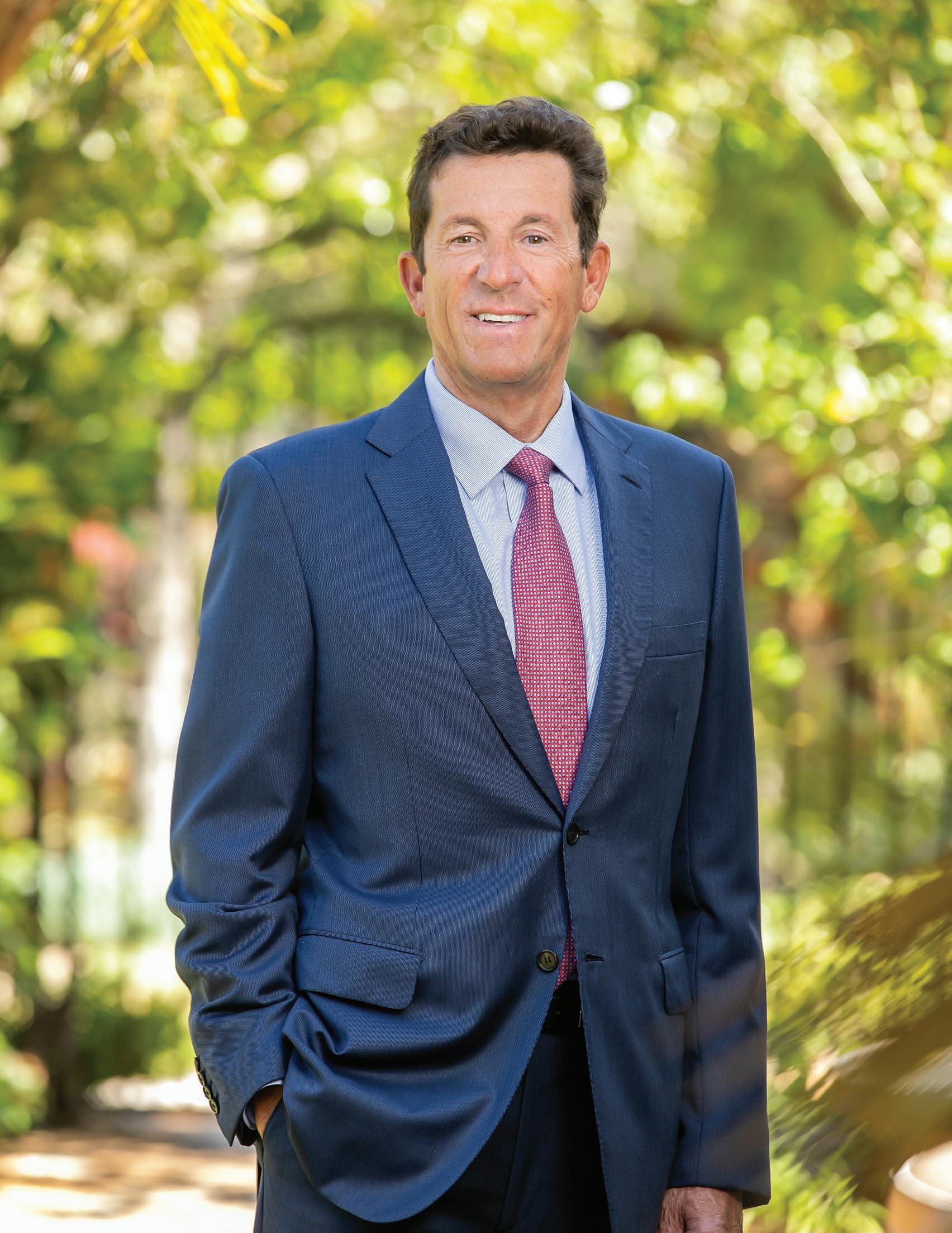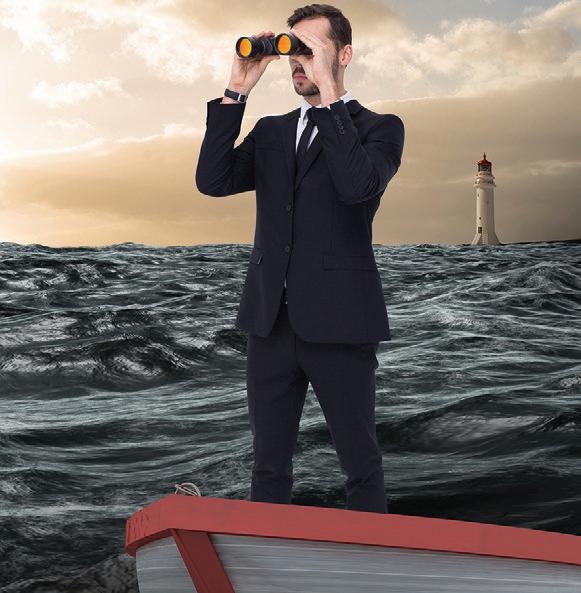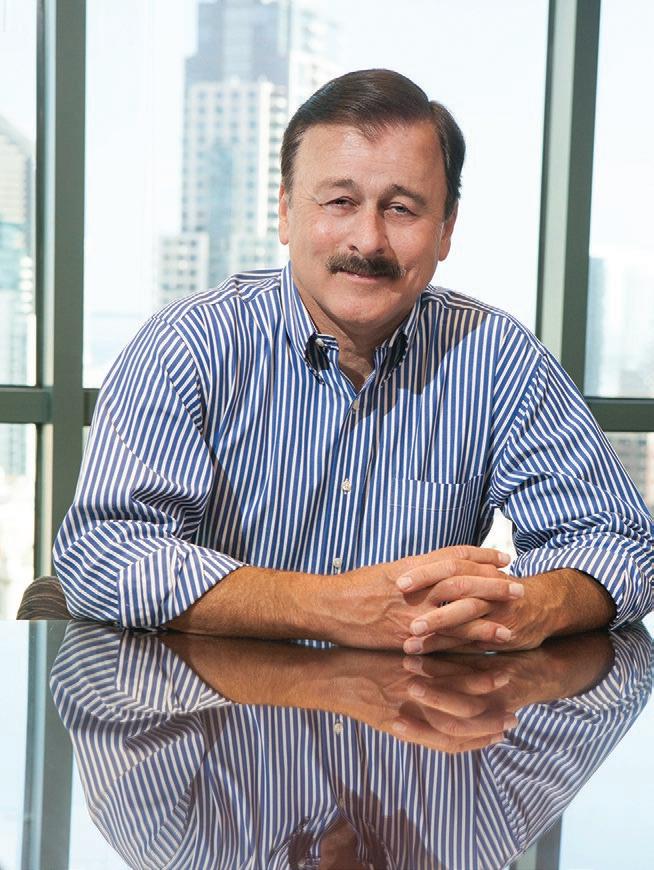
18 minute read
Prepare for the COVID Reptile
by Dr. Ken Broda-Bahm
Might a fear-based strategy have greater purchase in the present pandemic climate? People are certainly feeling scared and vulnerable these days. Even as states begin to relax the coronavirus stay-at-home restrictions, the death toll continues to climb, and a solid majority of the American public is not at all eager to get back out there. According to current Pew Research polling, nearly seven in ten Americans say their greater concern is with governments lifting restrictions too quickly, rather than not quickly enough. I expect that even after experts begin saying it is relatively safe to reengage, there will still be a lot of residual fear and some habits that might’ve changed for good. I have been chronicling many of the expected attitude changes in the wake of this crisis, and an additional perspective to consider is one that trades on fear and vulnerability: the plaintiff’s “Reptile” approach of trying cases by focusing on a personally relevant danger posed by the defendant.
In the context of the worldwide virus lockdown, there is a good chance that jurors might be primed for the kinds of fear appeals that the Reptile depends on. While jury trials don’t seem to be getting underway in the immediate future, once they do, we might expect the Reptile’s chances of success to be influenced by a persisting state of public fear. With a jury preconditioned to look for threats, the strategy might have special resonance in this context. In this post, I will take a look at some recent research and commentary that could point in that direction.
The Reptile in a COVID context might involve the plaintiff’s attorney drawing a literal or a figurative connection with the current situation, such that a stand against the defendant becomes a symbolic way of gaining more control or safety. It might include express or implied messages like this:
• We face too many risks (to our lives, health, and autonomy)
• The defendant is contributing to that risk at the worst possible time
• Taking a stand against the defendant’s actions protects society by setting a limit to what we will tolerate
There are a few attitudinal changes that bear on that message.
Less of a Pullback from Sympathy?
I have long noticed that there are many jurors who really don’t want to be influenced by the pathos of the case. If there is a particularly tragic loss or injury at the center of the case, then that fact will make that juror less likely to support that case. In what I call the “sympathy rebound,” the sad facts serve as a cue to this juror that the case is based on emotion and not
on evidence or logic. In some ways, the Reptile perspective is tailor-made to address that, because it reframes the case away from that individual tragedy and toward a common threat posed to all of us.
Based on a recent survey, however, we believe that there is some evidence that this sympathy rebound might be lessening in the current context. In other words, the pandemic’s role in putting many of us in a situation of potential threat and loss, has potentially created a little more empathy and a realization that tragic losses may indeed be real.
Last month, April of 2020, we returned to a group of 200 juror-eligible individuals that we had surveyed last Summer (July of 2019). We wanted to see if their views had changed in the midst of the pandemic. In several ways, we found they had, and in the direction of greater compassion. For example, they were more likely to say that we should be doing more to ensure well-being.
Society need to do more to ensure people’s well-being:
2019
2020
49%
56%
0% 20% 40% 60%
Source: Persuasion Strategies, BigJury 2019-2020, N = 205
80%
More specifically, respondents are also less likely to consider legal claims of damage to be exaggerated.
“Disagree” that most claims of disability, pain, and suffering are exaggerated.
2019
2020
56%
0% 20% 40% 60%
Source: Persuasion Strategies, BigJury 2019-2020, N = 205
68%
80%
Greater Sensitization?
Of course, that shift of opinion within our longitudinal respondent pool does not definitively prove that people changed because of the virus response, but it is a reasonable inference. In a recent Law360 article, “6 Lessons on Jury Advocacy in the Wake of a Crisis,” Frances Morrison and John Tanski of the firm Axinn Veltrop and Harkrider note that, “A good trial lawyer should not underestimate the mental, physical and financial suffering that COVID-19 has caused or the scars that it will likely leave on us.” Specifically, they describe a phenomenon that has also been studied under the heading, “terror management.” When reminded of our own mortality, we are likely to be open to some of those same themes from others:
“The thought of death alone in an intensive care unit—with loved ones unable to be present and caregivers separated by layers of personal protective equipment—is as disquieting as it is real. Themes of alienation, exclusion and abandonment will pick at a raw wound with many jurors. Deployed appropriately, these ideas can resonate for either a plaintiff or a defendant.”
The Flip Side: Greater ‘Normalization’ of Loss
On the flip side, it is also possible that the pandemic has provided some perspective that could normalize the idea that “everybody has experienced some loss,” or even make some claims seem trivial.
“The perspective that comes with the COVID-19 pandemic is likely to temper a jury’s impulse to assign blame for a tragic outcome, even in a sympathetic personal injury case. Jurors who have seen real suffering around them—and perhaps experienced it themselves through illness, the loss of a job, or the loss of a loved one—are more likely to be receptive to common personal injury defense themes like bad things happen to good people and there can be injury without fault.“
However it shakes out, and it is likely to be different in every case, legal strategies that try to personalize the case for a jury face an altered setting as a result of the coronavirus. Prepared attorneys on both sides of that strategy will have a particularly great need to know their audience, think broadly about what motivates them in understanding the case, and adapt. n
Dr. Ken Broda-Bahm has provided research and strategic advice on several hundred cases across the country for the past 21 years, applying a doctorate in communication emphasizing the areas of legal persuasion and rhetoric. As a tenured Associate Professor of Communication Studies, Dr. Broda-Bahm has taught courses including legal communication, argumentation, persuasion, and research methods. He has trained and consulted in 19 countries around the world and is Past President of the American Society of Trial Consultants.

After learning that local emergency responders faced a shortage of protective masks, Joel Selik and his wife, Kathleen, sprang into action. A recreational seamstress, Kathleen sews masks in their home. Joel periodically posts messages on listservs and social media, offering free masks to anyone in need.
Kathleen sews 50 to 75 masks per day. Joel packages, personally delivers, and mails the masks. Since Coronavirus reached the U.S., they have donated more than 1,000 homemade masks, including 435 masks to the Oceanside police and fire departments and additional masks to individuals, Rady Children’s Hospital, Sharp Healthcare, elder care facilities throughout southern California, two hospitals in Georgia, and a recent shipment to England.
All for free. In fact, they decline donation offers.
“As a family, part of our creed is to find ways to help others”, explains Joel.
Joel Selik is a sole practitioner representing plaintiffs in legal malpractice and debt collection matters. Always a team, Kathleen serves as his office administrator.
Joel Selik is not affiliated with the Vosseller Law Firm. Far too modest, Kathleen declined to be photographed.





f o r R e p r e s e n t i n g H u m a n B e i n g s i n P e r s o n a l I n j u r y C a s e s A Passion
by Dan Baldwin
I have the best job in the world. I am passionate about representing individuals in personal injury cases because plaintiffs, human beings who have been harmed, are overmatched when taking on insurance companies, corporations, the government or other major entities that are at fault. Our firm gives these individuals a voice and the confidence to pursue justice against those who have harmed them,” says Robert Francavilla, Partner at Casey Gerry Schenk Francavilla Blatt & Penfield LLP, San Diego’s most established plaintiffs’ law firm.
Francavilla focuses his career on serious personal injury, premises liability and highway design cases, including wrongful death, paraplegia, quadriplegia, severe burns, loss of limbs and major orthopedic injuries.
In a Wheelchair Unbound
John H. v. Clinton River Medical Products was a complex product liability case involving a client who was wheelchair bound and who sustained fractures to the bones in his lower leg when his wheelchair’s power assist mechanism failed. He was descending the wheelchair ramp from his van when the device failed, sending the plaintiff crashing into the running board of a parked SUV. The plaintiff broke his tibia and fibula and although he did not require surgery, he was left with chronic pain.
Francavilla’s client, a 53-year-old paraplegic, was an Olympic caliber swimmer at 19 when he suffered a spinal cord injury in a swimming pool accident. Shortly before leaving the rehab hospital, he and his parents were told that he’d never be self-sufficient, that he was unemployable, he’d always be in a wheelchair, and that he would need to live in a nursing care facility. Undaunted, Francavilla’s client finished school, went to medical school, graduated, and ironically returned for his internship at the rehab hospital where he was treated. “We weren’t about to let down a person of that strength and character,” Francavilla says.
The challenges in this product liability case were numerous and daunting. First, Francavilla had to convince a jury that someone who is paralyzed can still feel pain and in their client’s case, a heightened degree of pain.
The defense argued that since he had not had surgery, had not complained about the pain, had less than $30k in medical expenses, that he had suffered only a minor injury and was exaggerating the pain. “The difference between me and the defense is that I get to know the people I represent. Had the opposing attorneys done the same, they would have discovered that John just does not complain. From the time he suffered his spinal cord injury, through pre-med, medical school and on the job as a radiologist, he never wanted a handout and vowed to make it on his own regardless of the challenges he faced.”

A T T O R N E Y O F T H E M O N T H 2020 2020
Robert and partners (from left to right): Robert J. Francavilla, David S. Casey, Jr., Gayle M. Blatt, Frederick Schenk

Another challenge was the claim that their client earned a good living as a physician and didn’t need the money. Most young victims of spinal cord injuries go on public assistance and usually struggle through life. Persons close to the plaintiff stated the obvious truth that he was successful due to hard work, dedication, and a desire to earn everything that he got. He was proud to be a viable, tax-paying and self-sufficient member of society.
The jury found him honest and credible. After an initial pre-trial offer of about $300,000 the jury awarded him $7.6 million in a verdict. “His was a compelling story. He was a perfect example of someone making the best of a bad situation, who made it to the top of his profession and still fought to do the very best he could do,” Francavilla says.
Francavilla was awarded Trial Lawyer of the Year by the Consumer Attorneys of San Diego for his work on this and numerous other cases.
A Father’s Guidance Launches a Career
Francavilla traces his drive and decision to become a personal injury attorney back to the guidance his father gave him. “My life was on a conveyor belt. I just moved along and followed the rules, without a major goal or direction,” Francavilla says. That changed when his father suggested a career in law.
Francavilla says, “I was pretty good in debate class. I liked to argue and being the middle child in a family of three sons, I was always the mediator. I had some lawyer qualities and my father saw that. He gave me some of the most important advice of my life. He said you can give more than you take in this world and it’s a lot more satisfying. It’s important to care about people. You can be in a position to help people who can’t help themselves. That is how you leave your mark.”
Francavilla countered that he wasn’t the smartest guy in the world and possibly wasn’t up to an education in the law. “Dad said, ‘Yeah, but you have the passion and if you apply yourself, nobody can outwork you.’ Watching my dad often work two jobs to take care of my family and never giving up, was the impetus behind me wanting to become an attorney,” says Francavilla.
Getting the Low Down in Law School
He initially got into the four-year evening program, but the day before classes started, a slot in the three-year day program opened up and Francavilla grabbed it.
Francavilla still had concerns about whether he could cut it. During his first semester he received the lowest grade in the class in Contract Law. He went directly to the contract professor’s office with the intention of asking how to improve his efforts. Before Francavilla could say a word, the professor told him, quite seriously, that he might not be cracked up to be a lawyer based on his poor performance. In a scene right out of the law school movie, The Paper Chase, the professor even suggested that Francavilla go back to Admissions to see if he could get some of his money back and go on and do something else.
“I refused to let him decide my fate. I managed to graduate in the top half of my class—a success, yet nothing to write home about, passed the bar on my first try, and got a job as an insurance defense lawyer right out of the box. My goal then was to find work as a plaintiffs personal injury lawyer representing individuals,” he says.
“I love people. I love being around people and getting to know their background and what makes them who they are. These qualities and personality traits are probably my greatest assets as a trial lawyer. They serve me well not only by helping me to get to know the people I represent, but in talking to juries. I feel like I have an ability to relate to everybody and show I care.
“I’m also not afraid to do the hard work. I owe that to my dad and the human beings I represent. I fight until the end. To use a sports analogy, I never take a play off. I never think I’ve made it. I’m only as good as my last case. I never let up because I have to know I have done everything in my power to win, everything in my power to get fair and reasonable compensation for the people I represent. We go up against some of the best lawyers in San Diego, in California and sometimes the country. I have to be ready to give my all in every situation, to never coast. Fight to win within the bounds of ethics,” Francavilla says.
The firm handles a lot of catastrophic personal injury cases. Francavilla says, “Our opponents are usually powerful and have the legal and financial backing to put up a fight. Most people don’t have the type of legal and financial resources to go against defendants like these. When we take on a client, our fees are contingent on if we win.” Sometimes the firm incurs hundreds of thousands of dollars in expenses trying to win a case. As a businessman Francavilla realizes that if the firm doesn’t win, they’re out that money. Yet he would not have it any other way. “The people we represent have had their lives and the lives of their families ripped apart by the negligence of powerful entities that need to be held accountable. We are often their only hope for a better tomorrow,” he says.
Francavilla is not intimidated by the odds. “I like these challenges. I am not afraid of any of the lawyers or firms I go up against.”
“Thorough preparation is essential in a relentless pursuit of justice. We prepare every case as though it is going to trial. That is how I can get fair and reasonable compensation for the people I represent. Also, the fact I have a winning trial record and have demonstrated that I can deliver substantial and fair verdicts at trial lets my opponents know I am able to repeat those results in the courtroom time and again,” Francavilla says.
A Focus on a Special Group
Francavilla and his wife of 18 years, Carla, have two sons, Zach (14) and Dominic (10). He is very active in his sons’ lives, especially in sports and fitness activities. The boys are talented basketball players and love the game. Francavilla coaches his kids’ basketball teams. The family are big Lakers fans and attend as many games as possible. Francavilla is an active runner and enjoys weight training. His experience many years ago as an amateur racing car driver ties in nicely with Zach’s interest in go-kart racing.
Francavilla also discovered an interesting and rewarding way to involve his sons in his career. The firm conducts a lot of jury focus groups. He says that some of his best focus group information comes from his two sons. When discussing the facts of his cases with his boys, they often provide valuable insights. For example, in a case where he had to prove that
Team members (from left to right): Mary Jo Cunningham, Robert J. Francavilla, Carla Francavilla, Meagan L. Verschueren, Adam B. Levine, Christina Slomanson

a machine had mangled the hand of their client, it was a manager, or someone authorized by the manager who had removed the machine’s safety guard. The firm needed witnesses to find out if the manager had ever walked through and seen the unguarded machine. Zach quickly asked if the company had video cameras in the workplace. “I hadn’t even thought of that. They always give me a cut-to-the-chase assessment of the case and how I should approach it. They keep me from getting bogged down in the weeds, which I sometimes do. Plus, it’s fun and provides real quality time with my boys,” he says.
The bottom line in his approach to family, his career and his clients is constant. “If I can make a little part of this world better by raising good boys, loving and respecting my wife and improving the life of someone who through no fault of his own has suffered a tremendous loss, then I’ve gone a long way toward fulfilling what I believe is my life purpose.” n

© Bauman Photographers
Family: Carla, son Dominic (age 10), Robert and son Zach (age 14)
Contact
Robert J. Francavilla Casey Gerry Schenk Francavilla Blatt & Penfield LLP 110 Laurel St. San Diego, CA 92101-1486 (619) 238-1811 www.CaseyGerry.com
EXPERIENCE

» EDUCATION
• B.B.A. University of San Diego 1983 • J.D. University of San Diego 1980
» HONORS AND AWARDS • 2019–2020 Lawdragon 500 Leading Plaintiff Consumer
Lawyers • 2008–2020 Best Lawyers in America • 2007–2020 San Diego Super Lawyers • Robert J. Francavilla Named One of SD Metro
Magazine’s Best Attorneys for 2017 • 2016 Consumer Attorneys of San Diego Trial Lawyer of the Year • Consumer Attorneys of San Diego’s Outstanding Trial
Lawyers Award—SEVEN TIME WINNER • 2015 Top 25 Plaintiff Lawyers, L.A. Daily Journal, • 2014 Lawyer of the Year, Products Liability Litigation/
Plaintiffs, Best Lawyers • 2012 50 People to Watch in 2012, San Diego Magazine • 2012–2013 Top Attorneys, San Diego Daily Transcript • 2010 Top 50 San Diego Super Lawyers
» ASSOCIATIONS & MEMBERSHIPS
• State Bar of California • American Association for Justice (AAJ) • Consumer Attorneys of San Diego (Board of Directors, 1995–1999) • Consumer Attorneys of San Diego (Executive Board
Member 2000–2005) • Consumer Attorneys of San Diego (President–2005) • Consumer Attorneys of California (Member, Board of
Governors, 1998) • American Board of Trial Advocates (ABOTA)




















